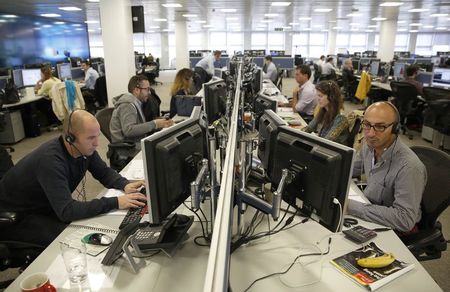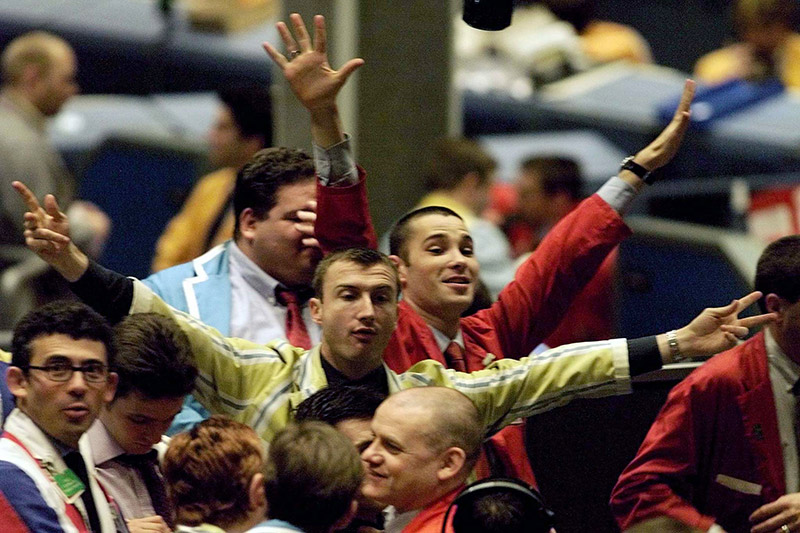By Nigel Stephenson
LONDON (Reuters) - London's trading rooms are gearing up for an extra long shift to cover Scotland's independence referendum and drafting in extra staff, anticipating a surge in activity when the result comes through early on Friday.
The vote on whether Scotland should end its 300-year-old union with England was set for a nail-biting finish. Three polls on Wednesday put opponents of independence slightly ahead, though many voters remained undecided.
The final result could come any time between 4 a.m. and 8 a.m. BST, before London stock and bond markets open and when currency trading is mainly concentrated in Asia, meaning some traders will be at their desks overnight or pulled in early.
"We are loading up ... For Thursday night/Friday morning we are having about 50 percent extra staffing. Things should quieten down by lunchtime," said Richard Wiltshire, chief foreign exchange dealer at ETX Capital and a 25-year market veteran.
Many of the biggest banks, with global operations, say they will rely on traders in other regions to handle any market reaction to developments in the small hours but some are beefing up staffing in London.
Credit Suisse is keeping its specialist sterling traders overnight in their London office for the referendum.
"Normally they would hand over to their colleagues in the U.S. and then on to Asia, but we will have these traders in overnight," said Adam Bradberry, a spokesman for the bank.
"It's about being able to service clients effectively... as well as managing our own positions."
HSBC is also extending coverage in London.
"We are planning for a later shift on Thursday night and an earlier shift on Friday morning," said Claude Goulet, head of FX & Commodities institutional sales. "We have 24-hour client coverage set up with our other centres as standard, but in this case, the possibility of increased activity might require additional support."
Which currency an independent Scotland would use has been a major bone of contention and the uncertainty over this and other issues has helped push the pound down 2.5 percent against the dollar this month
Simon Derrick, head of markets strategy at Bank of New York Mellon, will wake in London before 5 a.m. on Thursday and fly to continental Europe for the day before returning to grab a couple of hours sleep and settle in front of his computer screen to advise clients as results flow in.
The man at the sharp end of the currency debate if Scotland votes "Yes" is also putting in a long shift. Bank of England Governor Mark Carney will chair a meeting of the Financial Stability Board of bank regulators in Australia on Sept. 17 then fly back to be in Britain on the evening of Sept. 18.
The London Stock Exchange, where stocks on the FTSE 100 blue chips index trade, and the Liffe derivatives market for UK government bond futures plan no changes to trading hours on Friday, officials said. Both will open at 8 a.m. BST.
Even on a normal trading day, UK stock investors closely follow, and frequently take a punt on, projections released by financial spreadbetters before the market opens.
IG Markets, the UK's biggest spreadbetting provider by sales, was bringing in 16 extra staff divided between the United Kingdom, Australia, and Singapore.
"We've pretty much got the whole thing 24/7," IG analyst Brenda Kelly said. "We are expecting to hear the results around the five-ish mark... so this gives us a chance to assess the risk and whatever associated upside or downside or whatever it might be."
Improvements in technology mean some traders plan to burn the midnight oil at home rather than at their office desks.
"I'll be working late at home on Thursday to see if there are initial signs on the results then we'll see how it goes. I can always grab a few hours kip before the first official results come in," said the head of spot trading at another London bank.

"There will be liquidity around. The last time I did it was for the general election here in 2010 and it was a good night: there was a lot of action as the results went in different directions."
(Compiled by Nigel Stephenson; Reporting by Anirban Nag, Patrick Graham, John Geddie, Marius Zaharia, Lionel Laurent and Tricia Wright; Editing by Ruth Pitchford)
